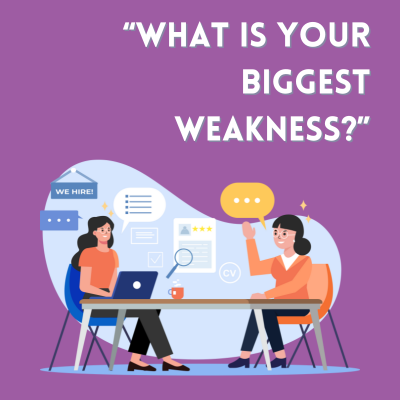
What is your biggest weakness?
Every interview is tough. If you've applied for a job, there's a good chance you really want the job and want to show the interviewer what you can do. This can be a nerve-wracking situation, and it's definitely not something you can get through without stress (unless you're completely cool-headed!).
However, some parts of the interview are more difficult than others, such as the weakness question. With a little preparation and thought in advance, this is not as difficult as many candidates think. Believe us, you will come through unscathed and still prove that you are the best person for the job.
So, what should you do the next time you are asked in an interview, "What is your biggest weakness?" Honestly, the last thing you want to do when you want to show that you're the best thing since sliced bread is admit that you have some kind of flaw. You don't want to give the interviewer the impression that you can't do the job by saying something like, `I'm not a morning person, so it's difficult for me to start work at 9 a.m.'
The problem is that you can't tell them that you don't have flaws either. Because a) it would look arrogant and b) the committee knows that everyone but Mary Poppins has flaws. And these days, you can't rely on the old sayings like "I work too much" or "I'm too much of a perfectionist." Because it's so overused that it's become a complete cliché.
So what can I say? Well, the most important thing to remember is that you need to turn the negative into a positive. Before your interview, first think about areas in your professional life that have been challenging.
Your potential employer wants confidence and self-improvement. So look for times when you made a mistake and corrected it, or when your manager praised you for making a change. For example, have you ever enrolled in a course or signed up for a company training or workshop? This shows that you've identified a vulnerability and worked to fix it.
A good example is speaking up in group situations, something many people struggle with. After mentioning this, you can say that you've attended a public speaking group or open mic night (if applicable), or that you've made an effort to bring up at least one of her points at a meeting.
Finally, I can explain that this reduced my shyness and increased my professional confidence. To get to the heart of this question, remember that great candidates are always looking for ways to improve and take the initiative to make sure that happens. If you are self-aware and can show that your weaknesses can lead to improvement, you will never waste an opportunity.
Here at MorePeople preparing candidates for interview is one of the key aspects of the work we carry out. If you're looking for a new job, please don't hesitate to get in touch by calling 01780 480 530 or email info@morepeople.co.uk. One of the team will happily discuss how we make the recruitment process as seamless as possible.
